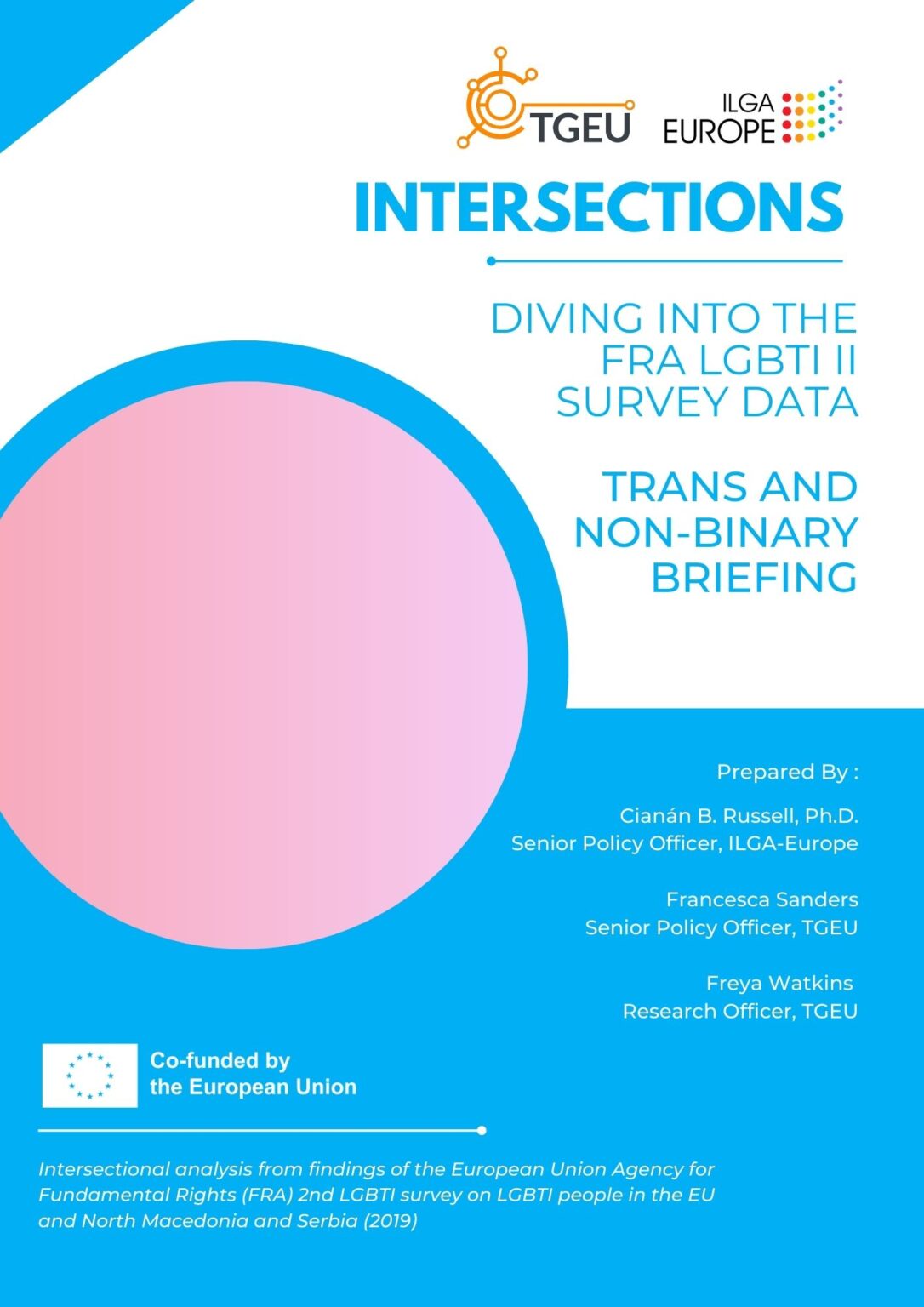New Report Reveals Impact of Intersecting Oppressions on Trans Experiences in Europe

TGEU and ILGA-Europe launch a joint report. This report explores trans and non-binary people’s experiences in relation to intersecting oppressions. This is part of the Intersections series: ‘Diving into the FRA LGBTI II Survey Data: Trans and non-binary briefing’.
Why this report?
This joint briefing takes a deeper dive than the initial 2020 FRA report, that provided general findings on the trans population as a whole. In this one, ILGA-Europe and TGEU go deeper to provide a summary of some of the most striking findings from an intersectional analysis of the data.
Disaggregating the data enables a nuanced understanding of the lived experiences of different communities within the trans population. This is precisely what is needed to design more effective policies and laws. The full data extraction is also available online.
What can I find in the briefing?
The briefing provides key findings from intersectional analysis of data. The original data is from trans respondents in the FRA LGBTI survey II. Topics include:
- Identities and demographic information
- Trans-specific issues
- Socio-economic status
- Experiences with discrimination, violence, and harassment
- Life satisfaction.
- Parenthood
The report also makes policy recommendations based on these findings. The recommendations guide key stakeholders in how to promote positive change for trans people facing intersecting oppressions.
The survey covered the 27 EU countries plus the UK, Serbia, and North Macedonia. It is the largest survey of trans people in Europe to date.
Main findings
The report reveals that trans and non-binary people who experience multiple and intersecting forms of marginalisation experience disproportionately more discrimination and violence. They also have lower socioeconomic status and life satisfaction than more privileged trans people. In particular, disabled, racialised, and intersex trans people all consistently reported higher rates of discrimination, violence, and life challenges than trans respondents overall.
Key findings include:
- 25.62% of trans and non-binary people responded that they had experienced housing difficulties. This number is higher for trans and non-binary respondents with disabilities (39.11%) and trans and non-binary respondents from ethnic minorities and/or migrant backgrounds (40.20%).
- The percent of trans and non-binary respondents who felt discriminated against when looking for a job is 31.79% (compared to 10.17% of all LGBTI respondents). This percent is much higher for trans and non-binary people with disabilities (44.73%) and trans women (43.03%).
- More than a quarter of trans and non-binary people felt discriminated against when showing their ID (25.82%, compared to 4.66% of all LGBTI respondents). Intersex trans and non-binary people reported this at the highest rate (42.06%), followed by trans and non-binary people with disabilities (39.13%).
- Trans and non-binary people who were physically or sexually attacked were less likely to report being attacked by a stranger than other LGBTI people who reported being attacked. Trans and non-binary people were more likely to report being attacked by family members, neighbours, colleagues, customers, or police officers or border guards.
- Trans and non-binary people were more likely to report being harassed by a family member than LGBTI respondents in general (8.00% and 6.30%, respectively). This increases significantly for trans and non-binary people with disabilities (9.68%), trans men (9.79%), and trans and non-binary intersex people (11.14%).
Recommendations for national governments and institutions
Based on the findings of the report, TGEU and ILGA-Europe call on national governments and their institutions to:
1. Ensure appropriate legal and policy frameworks for trans people. These must support trans people’s full involvement in society.
2. Fund community-led initiatives that help trans people find housing and employment. These should particularly focus on the most marginalised groups within the trans community.
3. Ensure that violence from service providers, healthcare professionals, police, schools, and other authorities is not tolerated. Further, implement sensitisation training programmes as preventative measures.
4. Make quality trans-specific healthcare available based on informed consent and accessible through public insurance coverage.
5. Collect high quality data about trans communities.
We hope this report will help policymakers, other stakeholders, and more privileged trans people understand the realities of intersecting oppressions facing many trans people in Europe. Furthermore, we hope this intersectional analysis presented will inform policy that makes a difference for the most marginalised trans and non-binary people in our communities.
For more information, please also refer to TGEU’s report on Trans Discrimination in Europe.